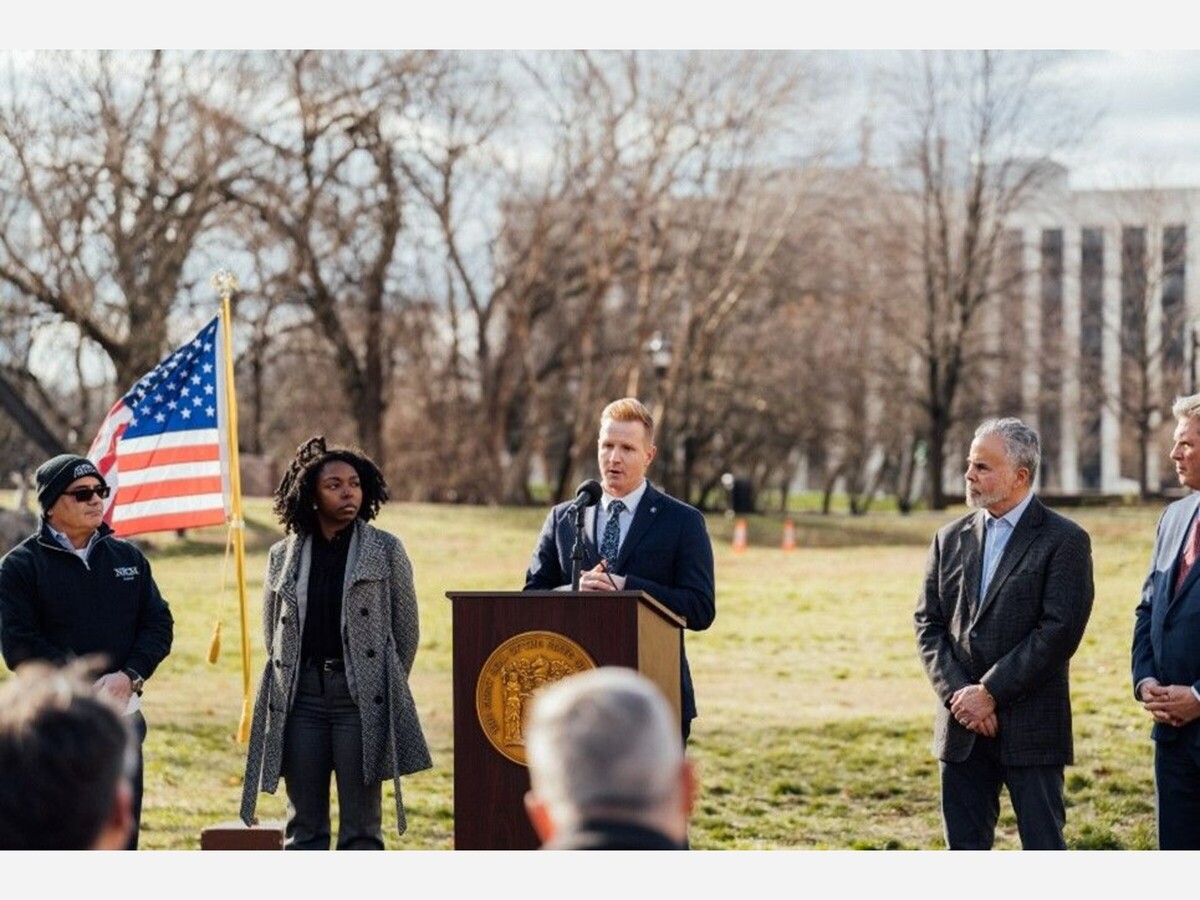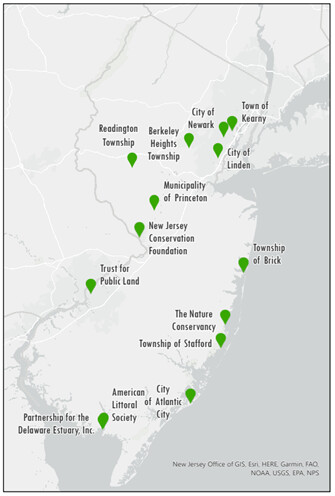Image


This week the NJ Department of Environmental Protection announced it had awarded a total of $24.3 million in Natural Climate Solutions Grants to local governments and nonprofits around the state to create, restore, and enhance New Jersey’s green spaces and tree canopies in urban areas, salt marshes, and forests.
The announcement comes quickly on the heels of Governor Murphy’s announcement of the planning of the 2024 Energy Master Plan, accelerating New Jersey’s climate goals to reach a 100% clean energy economy by 2050.
It is estimated that the projects funded by this $24.3 million investment will sequester 32,710 metric tons of carbon dioxide equivalent (MTCO2e) by 2050.
Carbon sequestration refers to the process of capturing carbon dioxide from the air by plants through photosynthesis and storage of that carbon in woody biomass and in plant-derived soil organic carbon.
While carbon sequestration is a naturally occurring process on land and in aquatic habitats, there are human actions that can help maintain and enhance carbon sequestration capacity to further help mitigate the effects of climate change.
Prime examples of ways to promote carbon sequestration include improved land management practices, such as reforestation (planting trees to support forest regeneration), urban community forestry (street tree planting), afforestation (planting trees on land that has been used for other purposes) and protecting tidal marshes from erosion. Protecting coastal ecosystems is particularly important since tidal marshes and seagrass meadows sequester more carbon per unit area than terrestrial forests.
The projects announced this week are funded through the state’s participation in the Regional Greenhouse Gas Initiative, a multi-state, market-based program that establishes a regional cap on carbon dioxide emissions from fossil fuel power plants.
[You can check out real-time updates on NJs RGGI here.]
The following projects will receive funding up to the stated amount through the DEPs Natural Climate Solutions Grant program:
 Map of projects around the state.
Map of projects around the state.City of Atlantic City, $759,000
Atlantic Avenue Street Tree Initiative
Atlantic City, along with a number of local project partners, will plant 180 trees along 13 blocks of Atlantic Avenue between Maine and Tennessee avenues.
In addition to increasing natural carbon sequestration, the project will provide increased shade and reduce the need for energy-produced air conditioning, reducing the heat island effect in a coastal, overburdened community.
Other project benefits include improvements to local air quality and a reduction in stormwater runoff and a promotion of groundwater recharge.
Berkeley Heights Township, $721,325
Berkeley Heights Tree Canopy Restoration
The township will work with the Berkeley Heights Environmental Commission (BHEC), Union County Division of Park Environmental Services, Arterial, and other stakeholders to plant 555 trees on township streets and rights-of-way and 120 trees to reforest a blighted area adjacent to Watchung Reservation.
These increases to the urban tree canopy in the township will sequester more carbon and will reduce stormwater runoff and the heat island effect.
Town of Kearny, $503,694
Kearny Urban Forest Canopy & Stormwater Mitigation
This project will improve water quality and air quality, increase community green space, and enhance the aesthetic of communal outdoor spaces in Kearny's overburdened communities through the planting of 300 street trees and 28 bioswales.
City of Linden, $355,500
City of Linden Urban Tree Restoration
The City of Linden will plant 540 trees across eight Blue Acres-acquired lots and three city-owned, partially Green Acres-funded parks and lots in the Tremley Point region, including Sgt. A. Wales Memorial Park and Louis Avenue Park.
The city will pair this carbon sequestration project with a public outreach effort which includes educational signage at each site and a public tree planting event with the local community.
City of Newark, $1,228,148
Newark Canopy Initiative
This project will remove hazardous, dead trees and plant 331 new trees in five target neighborhoods in the city. The planting areas – one in each ward – were selected based on community-centered analyses that identified areas of the city that have greater needs to increase urban tree canopy.
New Jersey Conservation Foundation, $1,336,125
Throwin’ Shade: Greening the Capital City
This project will plant a total of 1,000 trees on city streets that have few to no trees and in Cadwalader and Mill Hill parks that have experienced heavy losses of trees due to age and disease.
This project will sequester carbon, increase the urban tree canopy, and mitigate the urban heat-island effect, stormwater runoff, and poor water and air quality in Trenton.
Trust for Public Land, $1,035,668
Enhancing Camden’s Canopy for Climate & Community
Camden’s Natural Climate Solutions Collaborative will plant at least 800 trees across three public spaces and at least 215 trees in public housing complexes in the Centerville and Morgan Village neighborhoods in Camden City. Other priority tree-planting sites include Gateway Park, Reverend Evers Park, and Stockton Station Park.
American Littoral Society, $4,999,946
Restoring Marsh at the Mouth of the Maurice River
This restoration project is at a site within Delaware Bay at the mouth of the Maurice River. The project will restore 19.5 acres of tidal salt marsh using rock revetments at the tip of Basket Flats Marsh. It will also create up to 3,500 feet of hybrid living shoreline breakwaters and oyster reefs that will protect over 4,300 linear feet of shoreline along Basket Flats and Northwest Reach.
Township of Brick, $4,997,124
Forsythe Refuge Marsh Restoration
This project will lead to coastal wetland restoration of the U.S. Fish and Wildlife Service’s Edwin B. Forsythe National Wildlife Refuge in Brick Township. The project will place more than 120,000 cubic yards of suitable dredged sediment into a series of 13 cells to increase tidal salt marsh elevation, protecting the marsh from drowning.
The total area of sediment placement is approximately 95 acres of marsh. Added protective measures will be used to contain placed sediment and strengthen shorelines. The elevated marsh will be planted in areas that did not previously contain vegetation to ensure recolonization of vegetation occurs to ultimately restore the health of the marsh.
The Nature Conservancy, $1,846,470
Restoring Salt Marsh Habitats at Lighthouse Center
This project addresses salt marsh erosion, degradation, and loss caused by deficits in elevation and alterations in natural hydrology at the Lighthouse Center in Waretown, NJ.
7.58 acres of salt marsh will be re-established, and carbon sequestration will be increased through erosion control, improved hydrology, and increased elevation suitable to sustain a healthy marsh.
Partnership for the Delaware Estuary, $766,442
Living Shorelines Salt Marsh Carbon Sequestration at Matt’s Landing
This project will construct a living shoreline of 1,300 feet along a rapidly eroding salt marsh in the Maurice River at Matt’s Landing.
Stafford Township, $4,998,109
Stafford Township Popular Point Restoration Project
Stafford Township, in collaboration with the New Jersey Department of Transportation and the U.S. Fish and Wildlife Service, will enhance more than 33 acres of tidal salt marsh wetland as part of a living shoreline project. The township and project partners will utilize approximately 150,000 cubic yards of dredge material to elevate, re-stabilize, and revegetate the shoreline to protect against erosion and increase carbon sequestration in a portion of the Edwin B. Forsythe National Wildlife Refuge.
Municipality of Princeton, $552,000
Community Park North Forest Restoration
The 45-acre forest restoration project at Community Park North will involve removing invasive species with a combination of contracted labor and volunteers. Thousands of native trees will be planted to replace the non-native species.
Readington Township Environmental Commission, $250,000
Readington Township Meadow Afforestation
The Readington Meadow Afforestation project will plant native species of trees on 11 acres of selected open fields and meadows in Readington Township, returning these areas back to woodlands and reconnecting them with adjacent contiguous forests.
For more information about climate change, click here.
Improve mental health accessibility in our town! Donate to Morristown, NJs local mental health accessibility fund today!
 Scan or click to donate
Scan or click to donate*The 2022 Local News Fund is a program administered by the Local Media Foundation, a 501(c)(3) organization affiliated with the Local Media Association. The program’s purpose is to allow independent and family-owned news organizations to solicit tax-deductible donations from their communities for journalism projects focusing on critical local issues. Contributions to this program are tax-deductible to the full extent of U.S. law; please consult a tax advisor for details.